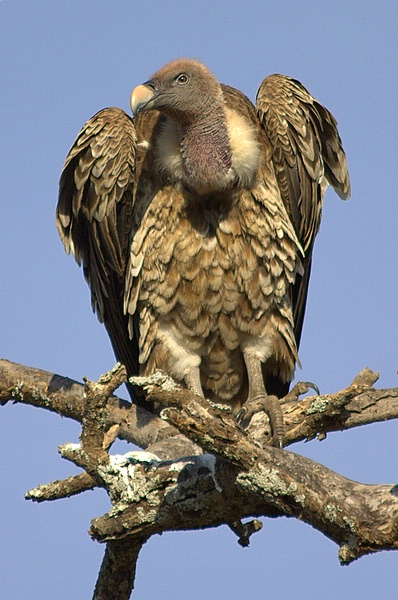|
| Query: ruppell's griffon | Result: 6th of 34 | |
Ruppell's Vulture (Gyps rueppellii) - Wiki
| Subject: | Ruppell's Vulture (Gyps rueppellii) - Wiki
| |

| Resolution: 398x600
File Size: 121067 Bytes
Upload Date: 2007:09:13 13:53:41
|
R??ppell's Vulture
From Wikipedia, the free encyclopedia
[Photo] Ruppell's Vulture (Gyps rueppellii) taken by Rob Schoenmaker in the Serengeti, Tanzania on 15-3-2005
R??ppell's Vulture (Gyps rueppellii) is a large vulture that ranges across much of central Africa, including Ethiopia, the Sudan, Tanzania and Guinea. It is also known as R??ppell's Griffon, Rueppell's Vulture, R??ppell's Griffin Vulture, and similar variants, and is named in honor of the 19th century German explorer, collector and zoologist Eduard R??ppell.
Description
Adults are close to a metre (3 ft) in length, with a wingspan of around 2.6 m (8.6 ft), and a weight that usually ranges between 7 and 9 kg (15.4-20 lbs). Both sexes are alike: mottled brown or black overall with a whitish-brown underbelly and thin, dirty-white fluff covering the head and neck. The base of the neck has a white collar, the eye is yellow or amber, the crop patch deep chocolate brown. Silent as a rule, they become vocal at the nest and when at a carcass, squealing a great deal.
Ecology
R??ppell's Vultures are highly social, roosting, nesting, and gathering to feed in large flocks. They can travel fast at need, cruising at up to 35 km/h, and will fly as far as 150 km from a nest site to find food. They can reach great heights, 6,000 m (20,000 ft) is not uncommon, and on one exceptional occasion, an aircraft over the C??te d'Ivoire collided with a R??ppell's Vulture at the astonishing altitude of 11,300 m (37,000 ft), the current record avian height. They have a specialised hemoglobin alphaD subunit of high oxygen affinity which makes it possible to take up oxygen efficiently despite the low partial pressure in the upper troposphere.
They are creatures of the more arid and mountainous areas of Africa: particularly semi-desert and the fringes of deserts. They roost on inaccessible rock ledges if these are available, or in trees, usually Acacia. When thermal updrafts start to develop enough lift, about two hours after sunrise, R??ppell's Vultures leave the roost and begin to patrol over the plains, using their exceptionally keen eyesight to find large animal carcasses, or carnivores which have made a kill. They will wait, several days if necessary, until a carnivore leaves a carcass. They have been known to take live prey on occasion, but this is rare.
R??ppell's Vultures have several adaptations to their diet and are specialized feeders even among the Old World vultures of Africa. They have an especially powerful bill and, after the most attractive soft parts of a carcass have been consumed, they will continue with the hide, and even the bones, gorging themselves until they can barely fly. They have backward-facing splines on the tongue to help remove meat from bone.
Status
Rarer than previously believed, R??ppell's Vulture is uplisted from a species of Least Concern to Near Threatened in the 2007 IUCN Red List.
http://en.wikipedia.org/wiki/R%C3%BCppell%27s_Vulture
| The text in this page is based on the copyrighted Wikipedia article shown in above URL. It is used under the GNU Free Documentation License. You may redistribute it, verbatim or modified, providing that you comply with the terms of the GFDL. |
|
Comments |
|---|
| | Samuel |
|
| dg6uJB Hello! I'm Samuel Smith, i'm from Switqerland i and find your site really brilliant! |
| | Guest |
|
Scientific Name: Gyps rueppelli (Brehm, 1852)
Synonyms: Gyps rueppellii (Brehm, 1852) [orth. error]
Common Names: Rüppell's Vulture, Ruppell's Vulture, Rüppell's Griffon Vulture, Rueppell's Griffon, Rüppell's Griffon
French: Vautour de Rüppell; German: Sperbergeier; Spanish: Buitre moteado
Taxonomy: Vultur Rueppellii A. E. Brehm, 1852, Khartoum, Sudan. |
^o^
Animal Pictures Archive for smart phones
^o^
|
|
|